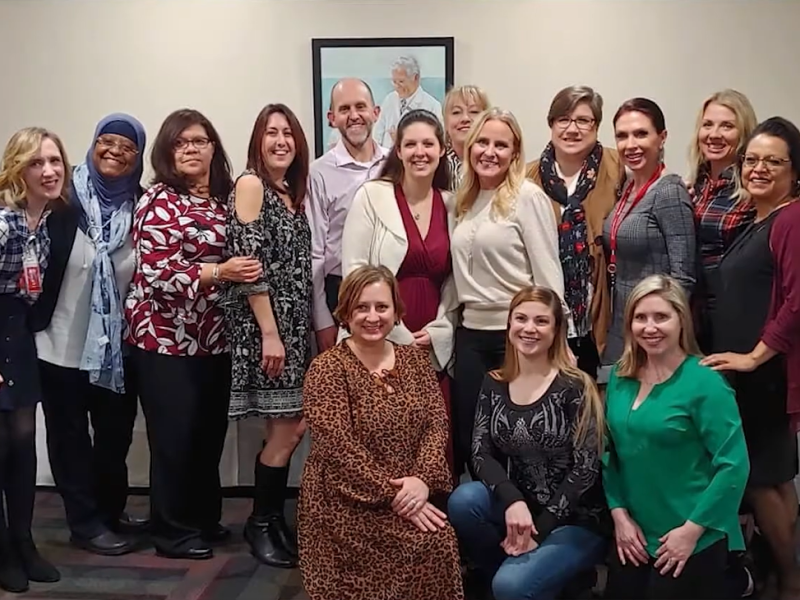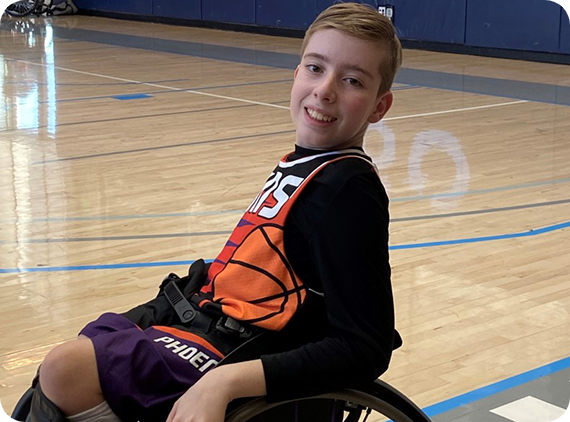At Phoenix Children’s, we rely on Patient Family Advisors to provide feedback that shapes how we care for patients and families. This page outlines several ways to serve as a Patient Family Advisor.

Patient Family Advisory Councils (PFACs)
PFACs are groups that bring together patients, families, clinicians, staff and leaders to strengthen care through collaboration. These groups ensure that decisions at all levels reflect the needs and perspectives of those receiving care.
Learn about the PFAC volunteer process.
Our active PFACs include:
Alumni PFAC members serve as senior advisors, keeping the needs of patients and families at the forefront. The Alumni PFAC is for parents and caregivers who completed a previous two-year term on another PFAC and would like to help with continual improvement.
Members meet quarterly to support other PFACs in their goals and efforts. They also help newer members during the learning process to ensure they’re comfortable with a specific council’s purpose, protocol and functions.
The Ambulatory/Inpatient PFAC focuses on sharing and improving the patient and family experience in all outpatient clinic and inpatient settings. This PFAC is for those with children or loved ones who’ve received care at Phoenix Children’s.
At monthly meetings, Phoenix Children’s administrators, staff and Patient Family Advisors discuss the Phoenix Children’s experience. The combined stories and suggestions lead to improvements in areas, such as specialty clinics, radiology, outpatient surgery, therapy clinics and other areas of care.
Since its inception in 2019, the Center for Cancer and Blood Disorders (CCBD) PFAC has partnered closely with CCBD leadership to share firsthand experiences and the care journey for children facing cancer and blood disorders. Members of the CCBD PFAC are families of children with cancer and blood disorders, who previously or are currently receiving treatment at Phoenix Children’s.
The Children’s Advisory Board (CAB) PFAC is a PFAC just for kids. It’s unique to the Phoenix Children’s experience because it gives children the opportunity to directly impact the health system.
The CAB PFAC is for patients and siblings of patients ages 12–18 who commit to being the voice of their journeys. Members serve to regularly remind both leadership and staff of the needs of children and teens.
Monthly during the school year, CAB members share their experiences with our facilities, programs and the overall Phoenix Children’s environment. This PFAC ensures that patient- and family-centered care is at the core of everything Phoenix Children’s aims to accomplish.
The Heart PFAC focuses on improving the patient and family experience at the Center for Heart Care and Cardiovascular Intensive Care Unit (CVICU). Families of patients who are receiving or have received heart care at Phoenix Children’s can join the Heart PFAC.
The Heart PFAC brings together families and clinical team members to share care experiences each month. Members offer input on a variety of topics, including daily practices and long-term projects.
“Before having our son Brendan, we didn't know anything about congenital heart defects or raising a child with unique and different needs. Phoenix Children’s has become our home away from home, and being on the Heart Patient Family Advisory Council has allowed me to collaborate with the doctors, nurses and staff who treat our children every day to make things better and easier for the next family on a similar path.”
– Laurie Sang, scribe, Heart PFAC
The Neonatology Neonatal Intensive Care Unit (NICU) PFAC is dedicated to providing the best possible experience for NICU families. Patient Family Advisors on the NICU PFAC include families with babies who are or have been treated in the NICU at Phoenix Children’s.
The NICU PFAC meets monthly to share experiences with the NICU, Nest Clinics and overall fetal care network, with a focus on patient family experience, safety and quality of care.
“From the moment our son was airlifted from Yuma to Phoenix Children’s, we knew he was in the very best hands. Born premature and spending six weeks in the NICU, he was cared for with an incredible mix of skill, dedication and compassion. We will be forever grateful to the doctors, nurses and staff who carried us through one of the most challenging times of our lives.
I am honored to serve as part of the Patient Family Advisory Council, providing guidance and perspective to make the journeys of future families better.”
– Jackie Kuechenmeister, chair, NICU PFAC
The Neuroscience PFAC strengthens care for patients with neurological conditions. Families who have had a child receive care at the Barrow Neurological Institute (BNI) at Phoenix Children’s can consider joining the Neuroscience PFAC.
During monthly meetings, members share perspectives and offer input to BNI leadership. The group hopes to provide a vital link between BNI and the community, as well as strengthen community and collaboration between families and their healthcare providers.
Patient/Parent Workgroups (PPWGs)
PPWGs bring together patients, caregivers and care team members based on specific conditions or communities. These groups allow staff with a particular focus to engage families in evaluating and planning programs and shaping improvements. PPWGs are staff-led, in partnership with Patient Family Advisors.
Our active PPWGs include:
El Consejo, our Spanish-speaking PPWG, provides recommendations to the healthcare team and leadership to improve safety, quality of care and the overall experience for our Spanish-speaking patients and families. El Consejo is for families of patients at Phoenix Children’s who speak Spanish as their primary language.
El Consejo members meet monthly to share experiences with hospital leadership. The goal is to improve communication between families and hospital employees and find ways to educate families about issues and medical services.
El Consejo, que es nuestro grupo de trabajo de pacientes y familias hispanohablantes (PPWG), le ofrece recomendaciones al equipo médico y al liderazgo para mejorar la seguridad, la calidad de la atención y la experiencia en general de nuestros pacientes y familias que hablan español. El Consejo está creado para las familias de pacientes de Phoenix Children’s cuyo idioma principal es el español.
Los miembros de El Consejo se reúnen mensualmente para compartir sus experiencias con el liderazgo del hospital. El objetivo es mejorar la comunicación entre las familias y el personal del hospital, y encontrar formas de informar a las familias sobre problemas y servicios médicos.
At Phoenix Children’s, the Cystic Fibrosis (CF) PPWG gives patients and family members a chance to improve care and services for themselves and others. Members find creative ways to help children stay as healthy and happy as possible throughout childhood and transition smoothly into adult care.
The CF PPWG is for adult patients or family members of those who have received care for cystic fibrosis at Phoenix Children’s. CF PPWG members meet quarterly or as needed with clinical teams to improve care quality, safety and the overall family experience.
“There are a lot of things about my son’s illness that I can’t control. When [the PPWG] was brought up to me, I thought, ‘this is something I can do to improve his experience.’
Being a workgroup gives us a little more flexibility. We only have to meet quarterly, although we do meet more often if we need to. It’s a little less structured than a council, and we can shift people in and out depending on what we’re working on.
You can use your voice to make changes that are going to improve the inpatient and outpatient experience for your child and yourself. That’s huge. You can really see what a difference you’re making.”
– Patricia Dean, former member, CF PPWG

Since 2017, families and providers have collaborated in the inflammatory bowel disease (IBD) PPWG to advance care for children with IBD and related disorders. The IBD PPWG is for families and patients with IBD, including those with ulcerative colitis or Crohn’s disease, who want to share their perspective on how we can improve the care we offer to all children.
Meeting quarterly or as needed, the IBD PPWG identifies challenges and works on solutions that improve quality, safety and communication throughout the care journey.
The Spina Bifida PPWG plays an important role in shaping care experiences for patients with spina bifida. This group is for patients and families who’ve received treatment in our Spina Bifida Clinic.
Members of the Spina Bifida PPWG share input on a variety of topics with the clinic leadership team as needed. The group focuses on improving communication, advocating for patients and families, providing resources and enhancing overall quality of care.
“For parents of children living with disabilities, having the opportunity to give feedback is important to help build and create a really great program. Phoenix Children’s has been amazing for us. Everything is family friendly, so we know what’s expected and what resources we need at each stage of development. We are so grateful for the care [our son, Zach, is] receiving at Phoenix Children’s.”
– Kim Zurliene, member, Spina Bifida PPWG

Hospital Committee Participation
Patient Family Advisors can also serve on hospital committees where participants share perspectives to support improvement efforts. Families experienced with any of these topics might consider applying:
- Catheter-associated urinary tract infection
- Central line-associated bloodstream infection
- Ethics
- Falls
- Hand hygiene
- Patient experience
- Peripheral intravenous infiltration and extravasation
- Quality and safety
- Sepsis
- Unplanned extubations
- Venous thromboembolism
Patient Family Faculty
Patient Family Faculty members use their stories to teach specific content to Phoenix Children’s staff and doctors. This group of Patient Family Advisors engages in orientation and other speaking engagements both internally and externally.
